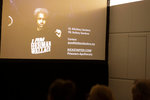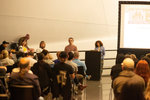


THURSDAY, Oct 3 — Wednesday night, artist jackie sumell, who intentionally does not capitalize her name as a political statement, gave a lecture at the Broad Art Museum to a full house of about 130 students, faculty and community members.
The crowd extended out of the education wing and around the corner, where people stood shoulder to shoulder, trying to catch the echos of her decades of work with incarcerated artists.
Sumell is a mother, multidisciplinary artist and prison abolitionist, who gained international acclaim for her collaboration with Herman Wallace of the Angola 3, which was immortalized in the 2013 Emmy Award-winning PBS documentary “Herman’s House.” She is also an MSU critical race studies artist-in-residence, a program made possible by the College of Arts & Letters and MSU Federal Credit Union.
The artist shared quotes from letters between her and Wallace, who was originally charged with burglary and served 41 years in solitary confinement at the Louisiana State Penitentiary in Angola — a prison farm located on the site of a former plantation. Wallace was one of three men convicted of murdering a correctional officer during a prison riot in 1972. In 2013, a federal judge ruled the original indictment was “unconstitutional,” and Wallace was freed, only to die four days later from cancer.
Sumell said working with Wallace changed her life and pushed her to the forefront of the campaign to end solitary confinement in the United States.
The artist shared her process of incorporating flowers, seeds and medicinal herbs as tools to help prisoners heal the communities they’ve been forced to leave behind. Her project, “Solitary Gardens,” comprises community-built, prisoner-designed green spaces at intentional locations across the country, such as repurposed prison grounds.
A fundraiser for her most recent project, “The Prisoner’s Apothecary,” started last month and aims to offer a mobile healing unit that turns the okra, soybeans and other plants grown in solitary gardens into medicinal salves, teas and tinctures. The Kickstarter fund emphasizes that all the medicine is designed by incarcerated individuals who “have a unique opportunity to heal the communities they are often accused of harming.”
The hour-long lecture was followed by a public discussion where audience members gave shout outs to local organizations such as Michigan Abolition and Prisoner Solidarity, No Detention Centers in Michigan and Humanity for Prisoners in Grand Haven.
The talk was followed by a Q&A where a woman in the audience asked about the repercussions of “releasing criminals back into the world” and how would she recommend stopping them from committing the same crimes again.
Sumell said that humans are innately violent and cause harm to others, sometimes unintentionally, on a regular basis. She added that her ideas are not original and claimed other societies, from indigenous tribes to the Norwegian government, do not rely on punishment and control to treat “social illnesses.”
“It’s rooted in this idea that hurt people hurt people, and yes we do have sociopaths that live among us — I think I dated most of them,” she joked. “But why continue to punish them for the rest of their lives? Can you still remove them and not feel the need yourself to continue harming them?”
Support City Pulse - Donate Today!
Comments
No comments on this item Please log in to comment by clicking here